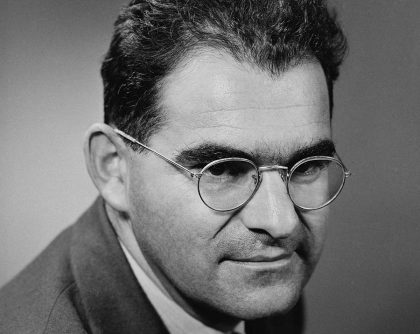Victor F. Weisskopf
Institute Professor Emeritus
In Memoriam:
September 19, 1908 – April 22, 2002
Research Interests
Weisskopf–called “Viki” by all who knew him–was noted for his theoretical work in quantum electrodynamics, the structure of the atomic nucleus and elementary particle physics. But beyond his purely scientific accomplishments, he played a leading role in explaining science–and its role in society–to the public. In the years since his work on the Manhattan Project in World War II, he warned repeatedly of the growing danger of nuclear war.
It doesn’t matter what we cover. It matters what you discover.
Victor Weisskopf
Biographical Sketch
Weisskopf was born in Vienna to Jewish parents and earned his doctorate inphysics at the University of Göttingen in Germany in 1931. His brilliance in physics led to work with the great physicists exploring the atom, especially Niels Bohr, who mentored Weisskopf at his institute in Copenhagen. By the late 1930s, he realized that, as a Jew, he needed to get out of Europe. Bohr helped him find a position in the U.S.
In the 1930s and 1940s, ‘Viki’, as everyone called him, made major contributions to the development of quantum theory, especially in the area of Quantum Electrodynamics. One of his few regrets was that his insecurity about his mathematical abilities may have cost him a Nobel prize when he did not publish results (which turned out to be correct) about what is now known as the Lamb shift.
From 1937 to 1943 he was a Professor of Physics at the University of Rochester.
After World War II, Weisskopf joined the physics faculty at MIT, ultimately becoming head of the department. At MIT, he encouraged students to ask questions, and, even in undergraduate physics courses, taught his students to think like physicists, not just to learn physics. He was a memorable teacher.
Weisskopf was a co-founder and board member of the Union of Concerned Scientists. He served as director-general of CERN from 1961 to 1966.
Weisskopf was awarded the Max Planck medal in 1956 and the Prix mondial Cino Del Duca in 1972, the National Medal of Science (1980), the Wolf Prize (1981) and the Public Welfare Medal from the National Academy of Sciences (1991).
Weisskopf was a member of the National Academy of Sciences. He was president of the American Physical Society (1960–61) and the American Academy of Arts and Sciences (1976–1979).
He was appointed by Pope Paul VI to the 70-member Pontifical Academy of Sciences in 1975, and in 1981 he led a team of four scientists sent by Pope John Paul II to talk to President Ronald Reagan about the need to prohibit the use of nuclear weapons.
In joint statement Preserving and Cherishing the Earth with other noted scientists including Carl Sagan it concluded that: The historical record makes clear that religious teaching, example, and leadership are powerfully able to influence personal conduct and commitment…Thus, there is a vital role for religion and science.
He married Ellen Tvede. He was survived at death by his second wife Duscha.
Obituaries:
- Weisskopf dies at 93; was protégé of physicist Niels Bohr [MIT News Office, 4.24.2002]
- In Remembrance: Victor F. Weisskopf (1908-2002) (PDF) [physics@MIT 2002]
More info:
- “Viki Weisskopf: Searching for Simplicity in a Complicated World” by David Kaiser [physics@MIT 2007]
- American Institute of Physics (AIP) Oral History Interview
Awards & Honors
- 2000 // Grand Gold Medal with Star for Services to the Republic of Austria
- 1991 // Public Welfare Medal (United States National Academy of Sciences)
- 1990 // Ludwig Wittgenstein Prize of the Austrian Science Fund
- 1988 // Enrico Fermi Award
- 1984 // Albert Einstein Medal
- 1983 // J. Robert Oppenheimer Memorial Prize
- 1982 // Austrian Decoration for Science and Art
- 1981 // Wolf Prize
- 1980 // National Medal of Science
- 1978 // Pour le Mérite for Arts and Sciences
- 1977 // Marian Smoluchowski Medal
- 1976 // Oersted Medal
- 1972 // Prix mondial Cino Del Duca
- 1956 // Max Planck Medal
Key Publications
-
Weisskopf, Victor (1991). The Joy of Insight: Passions of a Physicist. New York: Basic Books.
-
Weisskopf, Victor (1989). The Privilege of Being a Physicist. Essays. New York: W. H. Freeman.
-
Weisskopf, Victor; Kurt Gottfried (1984). Concepts of Particle Physics, vol. 1. (1986). Concepts of Particle Physics, vol. 2. New York: Oxford University Press.
-
Weisskopf, Victor (1972). Physics in the Twentieth Century: Selected Essays. Cambridge, Massachusetts: MIT Press.
-
Weisskopf, Victor (1970). Modern Physics from an Elementary Point of View. Geneva: CERN.
